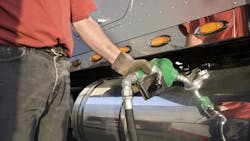I was recently a guest on Mark Willis’ Sirius XM radio program. One of the things Mark and I talked about was driving slower to save fuel. Diesel fuel is expensive and while prices have dropped a bit in recent weeks, diesel is still at record high levels. In some parts of the country, it’s as high as $6 a gallon.
As I told Mark, I think a lot of trucking companies look at fuel as a necessary evil; we get complacent that we just have to pay whatever the price is, and we think we have little control over fuel costs.
See also: The 'messy middle' is getting messier
I think the reality is different. We can do several things to get more miles from a gallon of fuel, and NACFE has studied more than 85 technologies and practices that fleets can use to improve their freight efficiency.
One of those things is slowing down. It takes a lot of fuel to get a truck up to speed and to keep it there. For every one mile per hour a truck consumes 0.1 gallons of fuel. A 5-mile-per-hour reduction in speed can save a fleet $5,000 to $6,000 per truck per year. That’s a pretty significant savings.
I know drivers say they can’t slow down because they get paid by the mile and the faster they drive the more miles they cover. I get that. But the reality of trucking is that drivers have limits on how many miles they can drive because of hours-of-service regulations. However, there are also operational reasons that drivers can’t just rack up miles, and that includes delivery windows and scheduling. I am a realist so I know that on some days—those when you have 500 miles to travel—you will need to go fast. But on days when you are only going 350 miles, consider slowing down.
See also: How to maximize fuel economy
In addition to saving fuel, there are some other advantages to slowing down. I can speak about this from experience of living in and therefore driving an RV. It is a lot less stressful to stay in the right-hand lane. When I do this, I find that I arrive at my destination a lot less tired and a lot more relaxed.
My advice is to try to slow down, but if you can’t bring yourself to do that then make sure your engine parameters are optimized for fuel efficiency, drive in cruise control as much as possible, spec low rolling resistance tires, use low viscosity oil and aerodynamic devices, and limit idling.
But I challenge each of you to try slowing down for a day or two to see what difference it makes in your fuel consumption and in your state of mind. Try it and let me know how it goes at [email protected].
Michael Roeth has worked in the commercial vehicle industry for nearly 30 years, most recently as executive director of the North American Council for Freight Efficiency (NACFE). He serves on the second National Academy of Sciences Committee on Technologies and Approaches for Reducing the Fuel Consumption of Medium and Heavy-Duty Vehicles and has held various positions in engineering, quality, sales, and plant management with Navistar and Behr/Cummins.
About the Author

Michael Roeth
Executive Director
Michael Roeth is the executive director of the North American Council for Freight Efficiency. He serves on the second National Academy of Sciences Committee on Technologies and Approaches for Reducing the Fuel Consumption of Medium and Heavy-Duty Vehicles and has held various positions with Navistar and Behr/Cummins.
